A business that operates in the HVAC sector needs effective financial management to achieve profitability and meet compliance requirements. Business organizations that do not maintain proper bookkeeping systems will experience revenue losses and operational inefficiencies in addition to tax complications.
The automation of financial operations through HVAC accounting software makes invoicing more efficient. It also tracks expenses and payroll and ensures tax compliance, which leads to stable operations in a competitive industry.
Financial mismanagement is the principal reason behind HVAC business failures in the market. According to available data, poor financial record management affects more than sixty percent of small HVAC businesses. Organizations that adopt HVAC accounting systems track revenue and handle costs with precision while maintaining correct records to defend their sustainable growth.
Business expansion requires both effective financial management and strategic marketing efforts. HVAC companies benefit from Best HVAC SEO Marketing Services which enable them to generate customer leads for growing their customer base. Integrating accounting software with SEO strategies in businesses results in substantial revenue growth by maintaining steady customer flow and preserving organized financial operations, according to studies.
Understanding Accounting Software For HVAC Businesses
HVAC accounting software represents a financial management solution that specifically assists heating, ventilation, and air conditioning (HVAC) businesses in enhancing their accounting procedures.
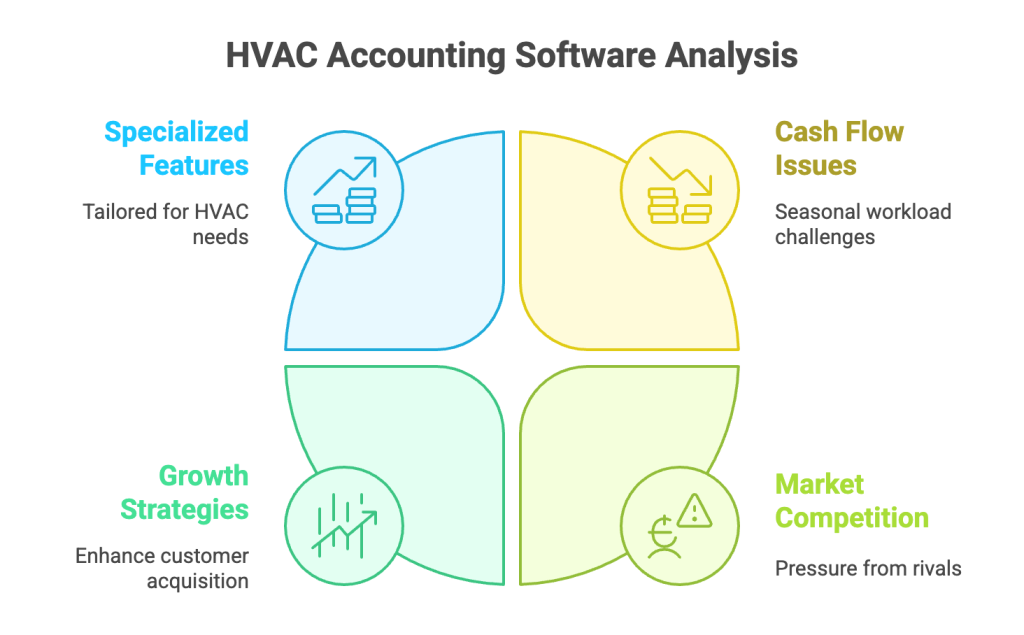
This specialized accounting solution goes beyond standard accounting tools because it contains features that address HVAC industry requirements, including a job tracking function, together with service call billing features, as well as payroll administration features and inventory management capabilities. The software operations produce accurate financial records alongside operational efficiency.
Financial management proves difficult for HVAC companies since both workload fluctuations and seasonal changes, and multiple expenses create avoidable difficulties.
Working with delayed invoices and managed costs leads HVAC businesses to face cash flow problems according to research findings that indicate more than half of these organizations experience this issue. Organizations that adopt the correct accounting software system remove these problems through workflow automation and better accuracy while meeting tax requirements.
- Automated Billing & Invoicing: Streamlines payment collection by automating invoice generation and follow-ups, reducing delays, improving cash flow, and minimizing errors in billing for service calls and maintenance contracts.
- Expense & Budget Tracking: Provides detailed expense categorization, monitors financial trends, and ensures accurate budgeting, allowing HVAC businesses to control costs, maximize profitability, and make informed financial decisions.
- Payroll & Tax Compliance: Automates payroll processing, calculates wages, and ensures tax compliance, reducing manual errors and ensuring timely payments while adhering to local labor laws and financial regulations.
- Field Service Integration: Synchronizes financial operations with scheduling and dispatching, ensuring seamless job tracking, accurate invoicing, and improved coordination between accounting and on-site HVAC technicians.
Financial stability remains important, yet business growth requires effective strategies for customer acquisition and retention. Multiple HVAC companies obtain maximum profitability by utilizing both referral programs and accounting software systems. The customer referral method delivers new leads at a lower price point than advertising does which strengthens long-term earnings yet avoids adding extra operating expenses.
A profitable HVAC business emerges when businesses integrate financial efficiency with deliberate customer acquisition tactics to create a flexible operation that stands strong against market competition.
Essential Traits Of Reliable HVAC Accounting Software
Organizations need to select appropriate HVAC accounting software because this decision establishes both financial data accuracy and operational effectiveness.
General accounting systems do not provide customized features for HVAC businesses because they need capabilities to generate invoices, manage payroll expenses, track costs, and fulfill tax regulations. Bookkeeping tools made for the HVAC industry allow organizations to minimize errors while optimizing funds and better managing their finances to achieve operational efficiency.
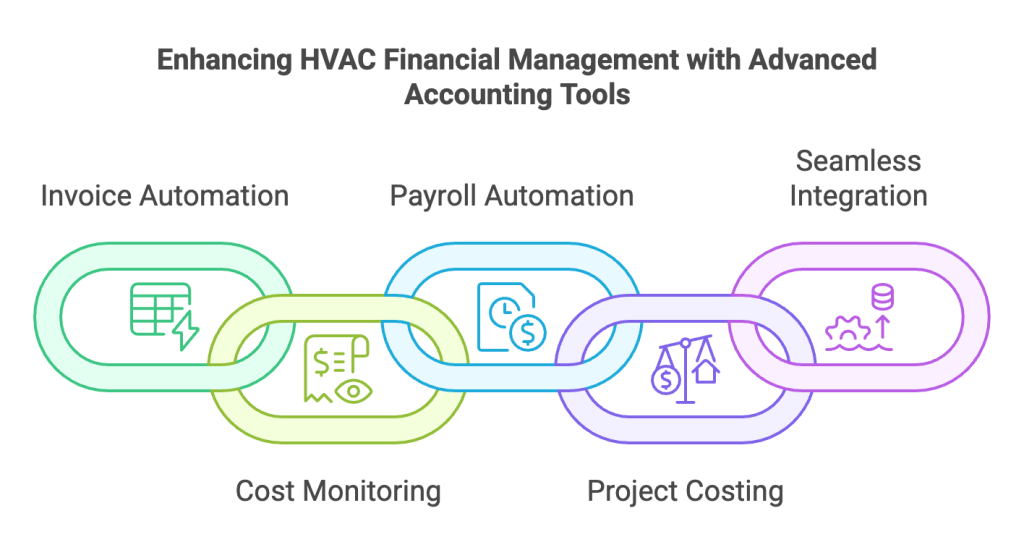
Top Accounting Capabilities For HVAC Companies
- Invoice Automation and Payment Processing
Automated invoicing cuts down on manual work to deliver time-sensitive bills after projects finish. Payment reminder systems help businesses collect payments on time, therefore improving their financial cash flow. Users can perform fast transactions through online payment gateways that accept credit cards and ACH transfers, and digital wallets. The streamlined process of payment processing enabled by automation reduces payment delays and provides better convenience to customers. - Cost Monitoring and Budget Control
Real-time cost monitoring helps HVAC firms to precisely track the costs of their resources, including materials, as well as employee labor and business overhead. Financial data points help organizations create budgets along with setting prices, and identify cost reduction opportunities. Businesses can achieve both high financial stability with quality services by controlling spending and optimizing all resources to achieve maximum profitability. - Payroll Automation and Tax Management
Payroll systems run by computers enable exact salary payments, together with proper tax withdrawals. Through tax management features, the solution determines and files taxes according to HVAC regulations, which minimizes compliance issues. Businesses succeed in accuracy enhancement through structured payment processes that eliminate errors and penalties which enables financial system optimization and meets industry standards. - Project Costing and Profit Analysis
Projects’ costing mechanisms provide HVAC business owners with tools to examine their profitability and adjust their rates properly. Organizations achieve higher cost efficiency through service call expense analysis because this practice helps them discover operational flaws to adjust their prices properly. Competitive prices and financial strength are supported through this method. - Seamless Integration with Field Operations
Business management becomes more efficient when financial information links with scheduling, dispatching and inventory applications. Operating with a single system streamlines operations better and cuts down on paperwork, and increases decision speed. The immediate availability of data helps organizations distribute resources efficiently to operate their business optimally and increase service quality.
| Feature | Significance | Value for HVAC Firms |
| Automated Billing & Collections | High | Minimizes payment delays and boosts cash flow |
| Expense Monitoring | High | Controls overspending and sustains profitability |
| Payroll and Tax Regulation | High | Guarantees precise employee disbursements and tax accuracy |
| Project Cost Analysis | High | Assesses project profitability |
| Integration with Field Operations Tools | High | Streamlines scheduling with financial management |
Boost Business Growth With The Ideal Accounting Software
Business growth becomes possible with HVAC accounting software that simplifies financial management. Budgeting and invoicing with precision enables HVAC businesses to control their cash flow, thus enabling them to develop referral programs.
Businesses should implement structured incentives through discounts or rewards to develop customer loyalty as well as acquire new clients. HVAC bookkeeping tools provide data-driven insights that help maximize expense allocation to direct resources toward lead generation and marketing initiatives.
Essential Reasons To Adopt HVAC Accounting Software
Companies that invest in HVAC accounting software enhance their financial records while streamlining operations and making their business more profitable. Contractors have trouble with payment delays, tax problems, and bad budget control when they lack a proper system for HVAC accounting. When these issues affect cash flow they require a structured accounting system for businesses to achieve growth.
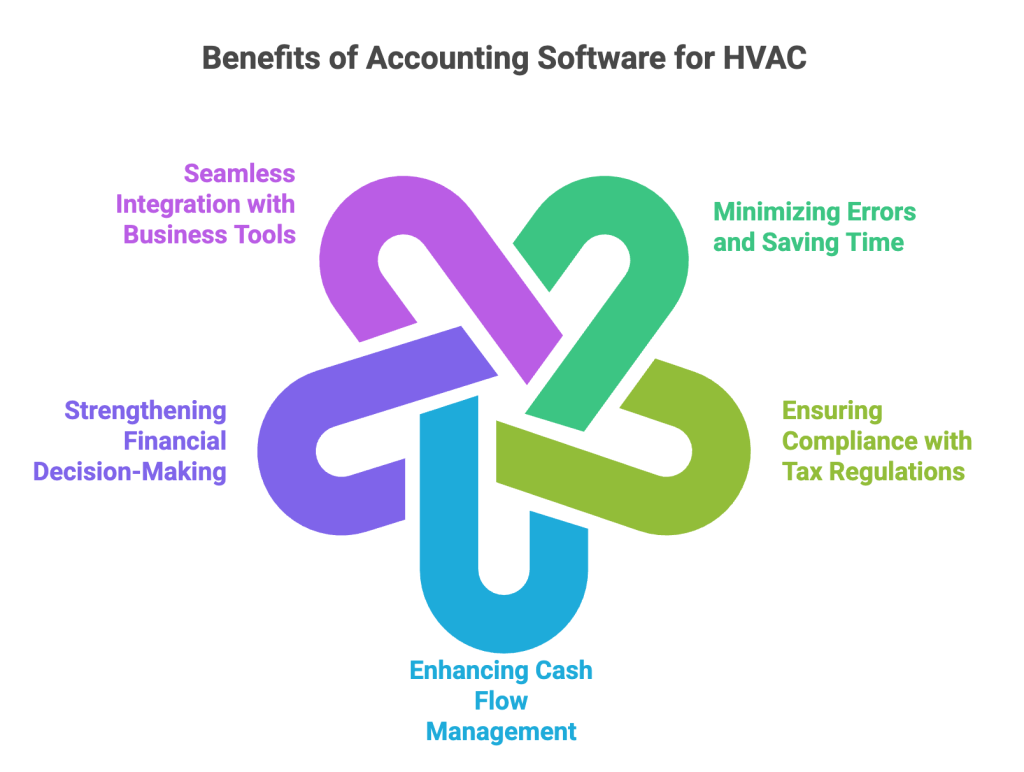
Top Advantages Of Using Accounting Software For HVAC Businesses
- Minimizing Errors and Saving Time
Automated accounting eradicates calculation errors that may cause financial disparities. It cuts down paperwork and automates most of the processes, constantly requiring little human intervention.
By using accurate financial reports, the owners of the businesses can make the right choices on the way that they are going to run their business, and make other important decisions with less mistakes that are costly and achieve the right operations. This aspect saves much time that can be utilized in the business expansion. - Ensuring Compliance with Tax Regulations
Calculations made by the computer decrease the likelihood of mistakes that cause IRS audits. Coordinated records make a big difference when it comes to filing taxes since all the records filed are accurate.
The system produces various reports of the deductions and expenses relating to loads of write-offs, aiding companies to seek tax deductions that are legal and relevant in reducing financial and legal risks resulting from noncompliance with new tax laws. - Enhancing Cash Flow Management
Real-time alerting of customers and stakeholders assures timely payments, thus lowering the cases of unpaid bills. Such tracking of revenue and expenses facilitates better financial control as the owners can control the cash flow in real-time. Because of avoiding cash deficiencies, companies stay on their operational steady path, do not pay penalties, and fulfill their obligations sanely. - Strengthening Financial Decision-Making
The business owners can easily track the profit margins, expenses, and revenues through the real-time financial reports. The individuals have adequate financial target settings and monitoring processes implemented when using this data.
Some of them are: The Key benefits of the system include the identification of the unprofitable jobs and costs, enabling business organizations to achieve functionality by controlling the price aspect, eradicating wastage, and enhancing their profitability. - Seamless Integration with Business Tools
Integration with field service management software enhances automation and improves the accuracy of the overall job cost. The integration of a payroll system with the payment processing will ease the burden of payment to employees in terms of time and labour.
Marketing tool integration is also a helpful evaluator to determine the viable options that can generate increased revenue. This, in turn, makes all the financial and operational transactions interlinked and run in a harmonized manner.
| Advantage | Efficiency Boost (%) | Typical Problems Addressed |
| Lower Human Errors | 85% | Financial miscalculations, duplicate billing |
| Quicker Invoice Processing | 60% | Delayed payments, unpaid balances |
| Better Cash Flow Oversight | 75% | Missed due dates, liquidity issues |
| Accurate Tax Reporting | 90% | Tax fines, filing mistakes |
| Reduced Admin Workload | 50% | Excess documentation, recordkeeping errors |
10 Most Effective Accounting Software Options For HVAC Companies
Businesses need to select appropriate HVAC accounting software to achieve efficient financial management while ensuring compliance with taxes and improving cash flow management. Business owners must select an accounting solution from the available options that fits their operational requirements for either automated invoicing or expense tracking or payroll processing, or financial reporting.
The implementation of software with marketing and customer relationship management strategies can create more efficient operations above basic accounting functionality. Businesses that use financial data to enhance their service delivery gain a better reputation and draw more customers for sustained growth.
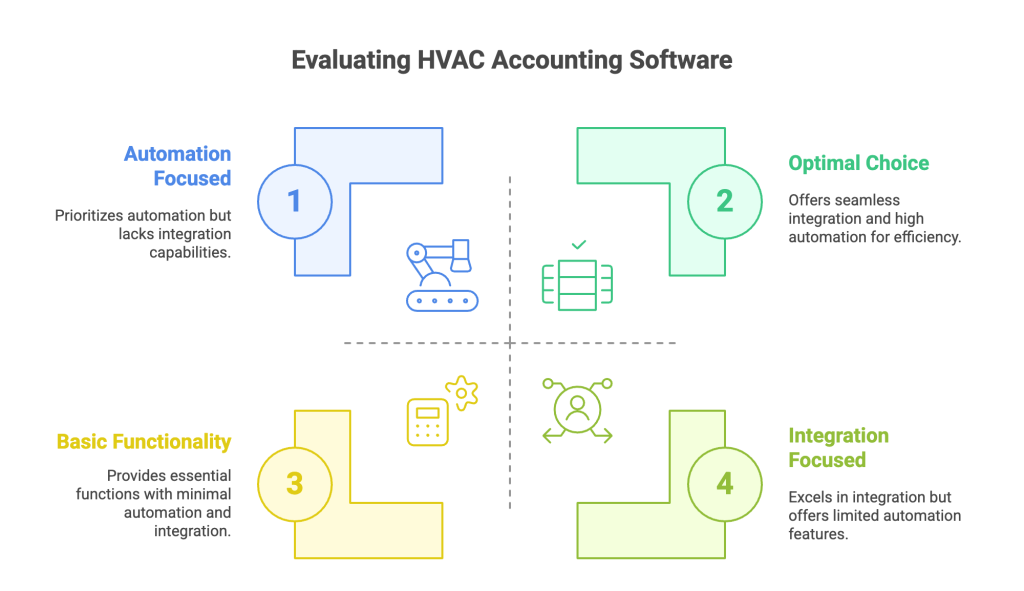
Key Considerations For HVAC Accounting Software
- User-Friendly Interface: A well-designed interface simplifies navigation, ensuring employees can quickly adapt with minimal training. Clear dashboards, logical workflows, and intuitive features reduce learning curves, allowing teams to focus on operations rather than struggling with complex software.
- Automation Features: Automating tasks such as invoicing, expense tracking, and payroll reduces the risk of human errors and eliminates repetitive manual data entry. This enhances efficiency, improves accuracy, and ensures financial records remain up-to-date without requiring constant manual intervention.
- Scalability: As an HVAC business grows, accounting software must handle increasing transactions, multiple service locations, and expanding financial complexities. Scalable solutions support additional users, advanced reporting, and higher data volumes, ensuring seamless financial management as operations grow.
- Integration Capabilities: Effective accounting software should sync with CRM and field service management tools to streamline workflows. Seamless integration ensures accurate data transfer between systems, improving billing accuracy, customer management, and overall operational efficiency.
- Cost & Value: Choosing software with essential features at a competitive price ensures businesses get the best return on investment. Cost-effective solutions provide robust accounting capabilities without unnecessary expenses, balancing affordability with the functionality required for financial control.
Comparing The 10 Best HVAC Accounting Software
| Software | Ideal For | Notable Features | Cost Range | User Score |
| QuickBooks | Small to mid-sized HVAC firms | Automated billing, expense monitoring, payroll | $25–$180/ month | 4.7/5 |
| Xero | Cloud-based operations | Stock management, project cost tracking | $13–$70/month | 4.5/5 |
| FreshBooks | Independent contractors | Time logging, client billing | $17–$55/month | 4.6/5 |
| Sage 50 | Medium-sized HVAC companies | Payroll handling, tax filing assistance | $56+/month | 4.4/5 |
| Zoho Books | Cost-effective option | Multi-user support, bank reconciliation | Free–$275/ month | 4.3/5 |
| Housecall Pro | Field service businesses | Task scheduling, automated transactions | $65–$169/ month | 4.8/5 |
| Jobber | Mobile-friendly users | Estimates, online payments, job tracking | $69–$169/ month | 4.6/5 |
| ServiceTitan | Large-scale HVAC firms | All-in-one platform, marketing insights | Custom pricing | 4.7/5 |
| Workiz | Expanding HVAC businesses | GPS monitoring, invoicing, payment tools | $45–$185/ month | 4.5/5 |
| FieldEdge | In-depth financial tracking | Client management, analytics tools | Custom pricing | 4.4/5 |
The Key Role Of Accounting Software In Scaling Your HVAC Business
HVAC businesses need well-structured accounting systems to manage cash flow efficiently and comply with tax regulations while reducing financial inconsistency. The system of proper financial tracking helps companies to avoid revenue losses while improving their daily operational efficiency. The combination of HVAC SEO marketing services helps businesses draw prospective customers along with preserving financial stability together with operational effectiveness.
Businesses that spend money on bookkeeping systems and SEO-oriented marketing systems acquire more customers, which results in improved profit margins. Accounting software performs automated tasks for billing processing, together with expense recording and tax preparation, which minimizes mistakes and cuts down work duration.
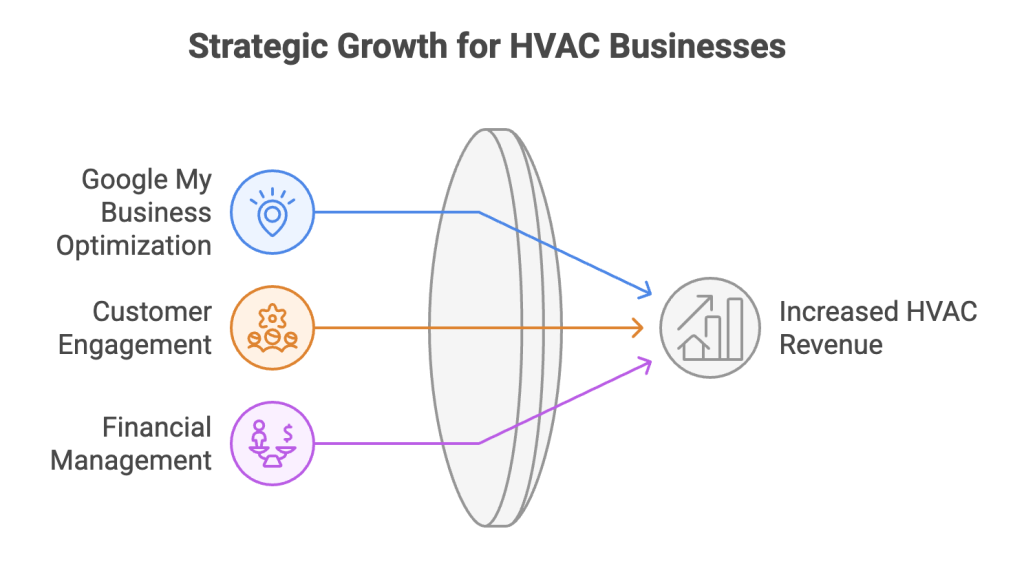
The combination of SEO marketing enables HVAC contractors to enhance their online exposure, which helps them connect with local consumers seeking HVAC services and generate a higher number of qualified opportunities.
Integrated digital marketing with accounting solutions allows HVAC companies to develop efficient scalability as well as reduce operational expenses and boost their profit margins. The combination of stability and sustainability provides organizations ability to deliver great services together with financial optimization for sustained success. The strategic unification creates a competitive advantage that produces continuous business expansion in a digital economy.
Boosting HVAC Revenue Through Targeted SEO Strategies
HVAC accounting software establishes financial stability for businesses, yet strategic marketing continues to build consistent growth.
A business needs an effective online appearance to succeed, which can be achieved through proper optimization of Google My Business accounts for HVAC services based in Houston, which brings better local search visibility. The strategy enables businesses to draw prospective customers and transform them into new clients.
A well-optimized Google My Business listing leads to better search rankings, which allows customers to locate HVAC services more easily. The credibility and customer engagement improve through consistent updates and correct business details along with customer ratings.
To achieve long-term market success, HVAC businesses must implement financial management strategies with their digital marketing approach, thereby maintaining a competitive position in growing markets.
Boosting Business Growth With HVAC SEO And Accounting Tools
SEO Drives Leads, Accounting Software Ensures Financial Stability
- An optimized Google My Business (GMB) profile helps HVAC businesses improve their local search ranking, making them more visible to potential customers.
- Leads generated through SEO require efficient financial management to ensure timely invoicing, accurate revenue tracking, and smooth cash flow.
Strong Online Presence Increases Customer Engagement and Revenue
- Businesses appearing in the top three local search results on Google receive significantly more inquiries, leading to higher booking rates.
- Implementing accounting software ensures that increased revenue is tracked efficiently, preventing financial discrepancies and improving overall business stability.
Local SEO Builds Trust, Streamlined Accounting Improves Payment Collection
- HVAC businesses optimizing their GMB listing in Houston experience a noticeable rise in service requests, directly impacting revenue growth.
- Automated invoicing and payment reminders through HVAC bookkeeping software help reduce late payments, ensuring consistent cash flow and financial health.
| Metric | SEO-Enhanced HVAC Companies (%) | Non-Optimized Companies (%) |
| Rise in Service Requests | 70% | 25% |
| Surge in Website Visitors | 80% | 30% |
| Quicker Invoice Settlements | 60% | 20% |
| Customer Retention Rate | 55% | 20% |
Boost Your HVAC Business In Houston With A Strong Google Listing
HVAC businesses operating in the competitive Houston market must maximize their Google Business Profile optimization. The combination of well-maintained GBP features, accurate business details, and consistent customer reviews and service descriptions enables better performance for HVAC businesses.
- Local Ranking Boosts Visibility: Appearing in Google’s local 3-pack ensures maximum exposure for HVAC businesses. Since most users click on top listings, ranking higher increases inquiries, giving businesses a competitive edge over lower-ranked competitors in local searches.
- Increased Traffic Drives Leads: An optimized Google Business Profile improves search rankings, attracting more relevant visitors. Higher traffic from local searches enhances conversion rates, turning website visitors into booked service appointments and long-term, loyal customers.
- Trust and Engagement Convert: Positive reviews, accurate business details, and active profile engagement build credibility. When potential customers see responsiveness and professionalism, they feel confident booking services, leading to higher conversion rates and business growth.
Pairing HVAC accounting software with SEO strategies strengthens business growth while ensuring financial stability.
Essential Factors For Picking The Best HVAC Accounting System
Businesses must choose appropriate HVAC accounting software because it assists in maintaining accurate financial documentation while enhancing cash flow and providing profitability throughout the long term.
Business owners need to evaluate the software based on price and core function strengths as well as system integration abilities. A properly selected software package enhances invoice generation along with expense tracking, combined with tax preparation features, which reduces errors together with improves general financial performance.
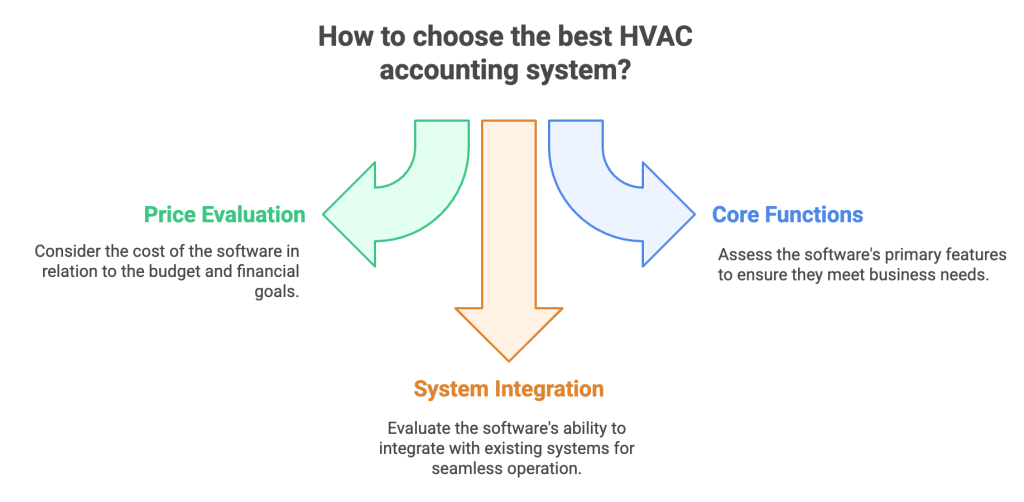
Effective financial management enables HVAC companies to secure funding in addition to supporting their regular business operations. Investors, together with lenders, favor businesses that present both organized records and clear financial reporting.
The application of adaptable software solutions enhances financial stability within HVAC businesses, thereby increasing their potential to attract funding from investors. The use of appropriate solutions leads to perpetual business growth coupled with increased market penetration.
A Practical Guide To Selecting The Ideal HVAC Accounting Software
Business Size and Operational Requirements
- Small HVAC contractors need invoicing and expense tracking to manage cash flow, monitor transactions, and ensure smooth financial operations without unnecessary complexities. A simple, user-friendly system helps streamline daily accounting tasks efficiently.
- Mid-sized companies require payroll management, job costing, and tax automation to handle employee wages, track project expenses, and maintain compliance. Automating these processes reduces errors, saves time, and improves overall financial accuracy.
- Large HVAC businesses benefit from advanced reporting, inventory tracking, and field service integration to manage large-scale operations efficiently. These features help monitor business performance, optimize resources, and enhance workflow management across multiple locations.
Scalability and Long-Term Growth
- Software should scale with business expansion, handling increased transactions, employee growth, and financial complexity without requiring frequent upgrades. Choosing a solution with built-in flexibility prevents disruptions as your company expands operations.
- Cloud-based solutions provide remote access to financial data, allowing teams to manage accounts and transactions from anywhere. This flexibility enhances productivity and supports business growth without requiring extensive on-site IT infrastructure.
- Integration with HVAC bookkeeping tools ensures seamless financial tracking by synchronizing transactions across platforms. This reduces manual data entry, minimizes errors, and allows for real-time monitoring of income, expenses, and financial performance.
Compliance and Taxation
- Accurate tax filings help HVAC businesses avoid penalties and maintain compliance with local, state, and federal tax laws. Automated tax calculations ensure correct filings and prevent costly financial mistakes.
- Automated tax reports assist with deductions, write-offs, and compliance by generating necessary documentation. This feature simplifies year-end reporting, helping businesses maximize savings while staying legally compliant.
- Multi-state tax support is essential for HVAC companies operating across multiple regions, as it automatically adjusts to different state regulations, ensuring proper tax collection, reporting, and filing without manual adjustments.
Integration with Business Tools
- CRM compatibility allows businesses to sync customer data with financial transactions, improving service tracking and client management. This integration helps streamline workflows and enhances customer experience.
- Field service management integration connects technicians with financial operations, allowing real-time job updates, invoice generation, and automated expense tracking to improve operational efficiency.
- Automated invoicing and payment collection reduce administrative workload, ensuring faster payments, improved cash flow, and fewer delays in processing customer transactions, ultimately enhancing financial stability.
Cost vs. Essential Features
- Compare pricing models carefully, evaluating whether a one-time purchase or subscription-based plan aligns better with your budget and business needs. Long-term cost-effectiveness should be a priority.
- Focus on value by selecting software that includes essential features such as payroll, tax automation, and reporting. Avoid unnecessary add-ons that increase costs without providing significant benefits.
- Be aware of hidden fees that may arise from integrations, upgrades, or customer support. Understanding total costs upfront helps avoid unexpected expenses and ensures a cost-effective software solution.
| Payment Structure | Advantages | Drawbacks |
| Single Payment | No ongoing charges, complete ownership | Expensive upfront, restricted updates |
| Recurring Subscription | Affordable entry cost, regular enhancements, cloud-based | Continuous payments, possible cost hikes |
| Basic Free Plan | Free core features, ideal for small businesses | Limited capabilities, upgrades needed for full access |
The Role Of HVAC Accounting Software In Securing Business Capital
Business funding becomes more accessible when companies maintain complete transparency through their financial records. Business accreditation from investors and small business loans and HVAC equipment funding will succeed better when organizations use HVAC accounting software to keep their financial records accurate.
- Higher Loan Approval: Lenders assess financial stability before approving funding, and HVAC businesses with accurate reports from accounting software demonstrate reliability, increasing approval chances by 65%.
- Faster Funding Process: Automated accounting streamlines financial reporting, reducing errors and delays, allowing HVAC businesses to process loan applications 40% faster than those using traditional bookkeeping methods.
- Stronger Investor Appeal: Investors seek well-managed businesses, and automated financial tracking signals strong operational control, reducing financial uncertainty and making the business a more attractive investment opportunity.
Businesses that implement HVAC bookkeeping tools to manage their finances and taxes will boost their loan applications and earn funding, thus driving sustainable development.
How HVAC Businesses Thrive With Advanced Accounting Software
The poor financial management practices in HVAC businesses cause their business to suffer revenue losses, accompanied by cash flow issues and tax penalties. Financial processes that are not managed generate multiple operational problems, which block expense tracking and invoice management and limit tax compliance requirements.
A business operating without well-organized accounting practices becomes susceptible to financial instabilities and payment delays, which can together lead to the loss of growth prospects.
Businesses gain better financial control through HVAC accounting software since it automates transactions while improving accuracy and reporting efficiency. The tools enable businesses to monitor their money movement as well as trace their profits together with their compliance with tax requirements. A defined method for bookkeeping allows HVAC firms to minimize mistakes and generate improved financial outcomes and organizational stability.
Case Study 1: How a Small HVAC Company Cut Late Payments by 60%
Challenge:
Precision Heating & Cooling, a small HVAC contractor, struggled with cash flow due to late customer payments. Their manual invoicing process led to frequent errors and delays, further complicating revenue collection.
Solution:
To streamline operations, the company implemented QuickBooks Online for automated invoicing and real-time payment tracking. Additionally, they optimized their Google My Business profile for HVAC services in Houston, improving local visibility and increasing service inquiries.
Results:
- Late payments dropped by 60% within six months.
- Automated invoicing improved payment processing, enhancing customer satisfaction.
- Repeat business grew by 25% due to consistent follow-ups.
Case Study 2: HVAC Firm Scales Operations And Achieves 30% Higher Profits
Challenge:
Airflow Masters experienced major financial losses stemming from inadequate expense tracking that produced incorrect job costing data and cut into their profits. Airflow Masters needed to resolve payroll processing issues because errors created compliance problems and expensive payroll tax penalties.
Solution:
Airflow Masters used Sage 50 Cloud to automate job costing and payroll management systems because of their operational challenges. Real-time financial tracking became possible through software integration between field service management tools and their accounting software system.
Results:
- 30% increase in job profitability due to precise cost tracking.
- Elimination of $10,000 in payroll tax penalties by ensuring compliance.
- 40% reduction in administrative workload, allowing leadership to focus on scaling the business.
Case Study 3: How A Major HVAC Company Expanded Efficiently With Advanced Accounting Software
Challenge
A large HVAC company named Climate Control Experts operated from several locations but encountered problems with financial data management across its multiple branches. The repetitive use of different reporting methods prevented performance tracking, which resulted in difficulties when making business decisions.
Solution
Service Titan became the new financial tracking system, which the company deployed to solve its current inadequacies. Real-time insight data automatically produced by AI analytics and automated reporting eliminated financial data discrepancies and enhanced organizational transparency.
Results
- 50% revenue growth in two years due to improved financial management.
- Stronger data-driven decision-making, enhancing operational efficiency.
- Expansion into three new locations, driven by increased profitability.
| Company Size | Challenge | Software Implemented | Performance Boost (%) |
| Small HVAC Provider | Delayed payments, manual billing | QuickBooks Online | 60% fewer late payments |
| Medium HVAC Firm | Inefficient expense tracking, payroll mistakes | Sage 50 Cloud | 30% higher profit margins |
| Large HVAC Enterprise | Financial mismanagement across branches | ServiceTitan | 50% revenue increase |
Financial Mistakes That Weaken HVAC Businesses
HVAC businesses need to handle their financial affairs properly to ensure both profitability and long-term growth. Many organizations face financial management complications because of their problems with bookkeeping errors and incorrect expense monitoring, and inadequate invoicing approaches which create cash flow turbulence.
Such mistakes without a formal structure will grow over time and create financial instability and tax obligations that cause harm to operational business processes.
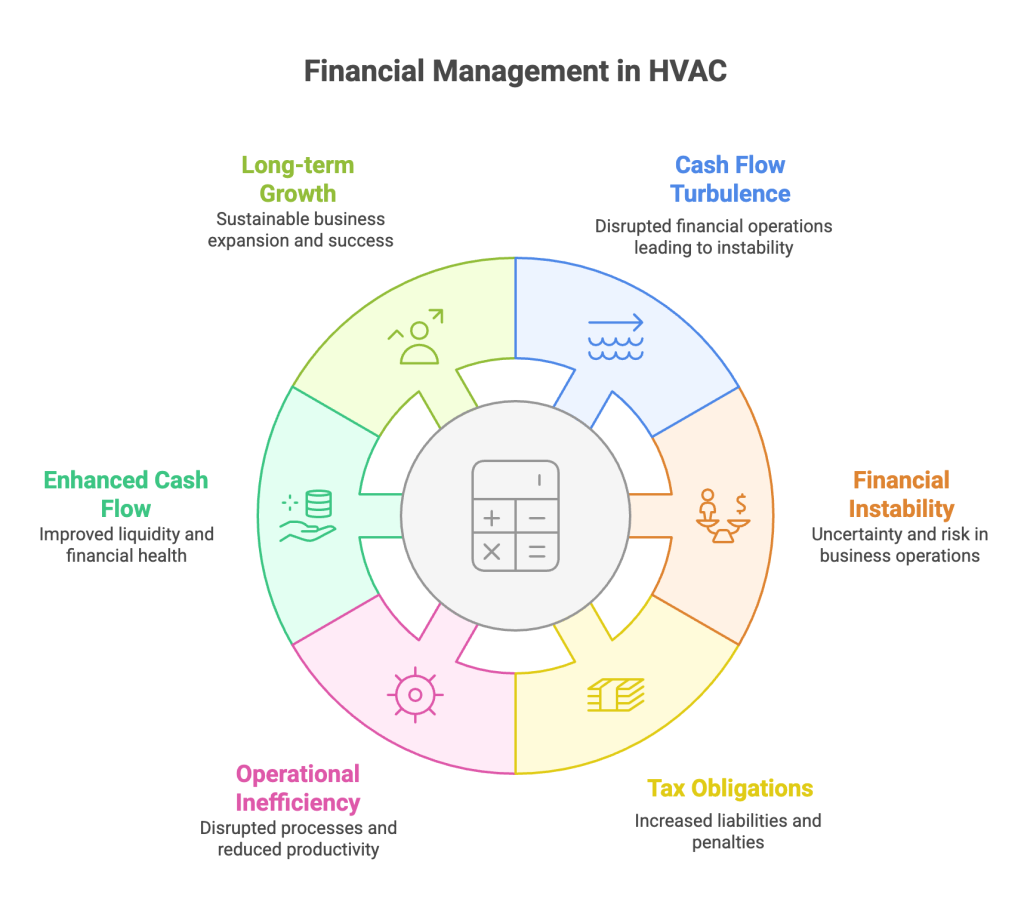
Businesses utilizing HVAC accounting software achieve financial process efficiency by making invoices automatic and managing expenses with full tax guidelines.
Accurate financial data enables businesses to base their decisions on fact using reliable evidence so they can prevent penalties and enhance cash flow operations. An efficiently organized accounting process provides two key benefits: operational efficiency as well as long-term market growth.
Lack Of Expense Tracking Could Harm Your Finances
HVAC businesses face challenges in expense tracking, particularly when dealing with recurring small expenses like fuel and tool maintenance, and minor equipment repairs.
These costs, which are not tracked properly, add up over time to create incorrect financial data. Businesses having an unclear financial outlook struggle to measure project profitability and create better pricing strategies, and handle cash flow management.
Benefits Of HVAC Accounting Software:
- Comprehensive Expense Tracking: HVAC accounting software ensures that every cost, including materials, labor, and minor recurring expenses, is accurately documented. This helps businesses maintain precise financial records, reducing the risk of miscalculations and unexpected budget shortfalls.
- Real-Time Financial Monitoring: By providing up-to-date insights on job-related expenses, businesses can track spending in real-time. This allows for better budget management, quick adjustments to financial strategies, and prevention of overspending on labor, equipment, or materials.
The Risks Of Overlooking Job Costing In Your Business
HVAC companies need job costing to evaluate their project profitability through a vital process. Job costing requires organizations to monitor every expense, from direct and indirect costs that appear in installation work and repair services, and service requests.
A business that implements flawed job costing systems will likely set services at inadequate prices thus causing both financial losses and subpar pricing decisions. Wrong cost tracking leads to cash flow complications which hinders business sustainability besides making it impossible to invest in operational development and growth.
- Real-Time Expense Tracking: Tracks every cost associated with service calls, installations, and repairs as they occur. This prevents overlooked expenses, ensures accurate billing, and helps businesses maintain precise financial records for improved budgeting and profitability.
- Automated Cost Calculations: Eliminates manual errors by automatically factoring in labor, materials, and overhead costs. This ensures that every job is priced accurately, preventing undercharging and ensuring businesses maintain healthy profit margins on all projects.
Overlooking Tax Season Deadlines
The process of preparing taxes remains difficult for HVAC businesses who operate with disordered financial documents and disconnected expense monitoring and human-driven error-prone data entry.
Organizational challenges cause HVAC businesses to lose valid deductions and delay tax filings, which results in IRS penalties. A structured accounting system becomes essential because it enables HVAC contractors to monitor revenue streams while handling payroll responsibilities and meeting current tax requirements.
Benefits of HVAC Accounting Software:
- Automates tax calculations to ensure timely and accurate filings: The software automatically calculates tax liabilities, ensuring accuracy and compliance with IRS regulations. By eliminating manual errors, businesses avoid penalties and late fees, keeping financial operations smooth and stress-free.
- Identifies all eligible deductions, reducing tax liabilities: With built-in tracking features, the software categorizes expenses and highlights deductible costs. This helps HVAC businesses claim every eligible deduction, lowering their overall tax burden and improving profitability.
Overlooking Cash Flow Leads To Financial Instability
A lack of proper cash flow control results in payment failures and delayed billing, which ultimately creates financial instability that disrupts ongoing business operations. Tracking income and expenses presents a challenge to many HVAC businesses since it makes it hard to fulfill operational costs or supplier payments, or investments for growth.
Informal cash flow management systems cause businesses to experience debt accumulation along with credit problems which create obstacles for long-term profitability.
How HVAC Accounting Software Helps
- Cash Flow Forecasting: Predicts financial trends based on past transactions and market conditions, allowing businesses to prepare for fluctuations during peak and off-peak seasons. This helps in managing budgets and avoiding cash shortages.
- Automated Invoice Reminders: Reduce delayed payments by sending automated notifications to clients before due dates, ensuring steady revenue. This minimizes outstanding balances and improves financial consistency.
The Risks Of Combining Personal And Business Money
Businesses frequently make the error of combining personal finance with business finance which results in financial mismanagement and tax complications and potential legal complications.
Business and personal expense mix-ups cause cash flow tracking difficulty which reduces profitability assessment ability and hinders tax compliance management and deduction management. HVAC businesses require precise recording of their diverse expenses between equipment and labor and service costs.
How HVAC Accounting Software Helps:
- Clear Separation of Finances: HVAC accounting software prevents the mixing of personal and business transactions by maintaining distinct records. This separation minimizes errors, simplified bookkeeping, and ensures compliance with tax regulations, reducing the risk of audits or financial mismanagement.
- Accurate Financial Reporting: With real-time tracking of income and expenses, the software provides clear financial insights. This enables HVAC business owners to assess profitability, identify cost-saving opportunities, and make data-driven decisions that improve financial health and long-term growth.
| Common Error | How HVAC Accounting Software Assists |
| Poor Expense Tracking | Automatically logs and classifies all expenditures |
| Overlooking Job Costing | Offers comprehensive cost analysis for every project |
| Lack of Tax Preparation | Computes taxes automatically and generates reports |
| Neglecting Cash Flow Monitoring | Tracks cash flow in real time and sends payment alerts |
| Mixing Business & Personal Finances | Ensures clear separation between business and personal funds |
How HVAC Accounting Software Is Evolving For The Future
HVAC industry expansion drives continuous advancement of accounting software through emerging technological developments. The three technological components in this model combine robot automation with artificial intelligence systems that operate from cloud-based platforms.
The innovations enable HVAC businesses to manage their finances more by increasing operational efficiency and improving both accuracy and decision-making capabilities for financial management as well as industry requirements fulfillment under regulatory conditions.
AI-powered intelligence systems assist HVAC businesses in predicting expenses and developing optimal budgets, and processing invoices through automated systems. Companies using cloud platforms accomplish real-time data sharing that drives better cooperation between their teams. Further advancement of these technologies will create more effective HVAC financial management which reduces errors while boosting business productivity within a competitive market environment.
Artificial Intelligence (AI) And Automation
HVAC accounting software undergoes a significant transformation through AI along with automation because these technologies help users with data analysis, financial accuracy and better decision-making capabilities.
Advanced technologies allow businesses to analyze massive financial datasets with speed and precision, which produces valuable insights beyond human-level forecasting abilities. The implementation of AI allows HVAC companies to maximize financial system efficiency and minimize errors for improved business profitability.
Key Advantages of AI in HVAC Accounting:
- Predictive Analytics: AI enables businesses to forecast financial trends, such as cash flow fluctuations, seasonal revenue variations, and potential financial risks. This predictive capability allows HVAC companies to anticipate changes in demand, adjust budgeting strategies, and allocate resources.
- Automated Expense Management: AI-driven software automates expense categorization, reconciles bank statements, and detects anomalies in financial transactions. This reduces manual bookkeeping efforts, minimizes errors, and enhances compliance with financial regulations.
- Optimized Pricing Strategies: By analyzing historical job costs, material expenses, and labor trends, AI suggests pricing adjustments to maximize profitability. Businesses can fine-tune their pricing models based on real-time market conditions, ensuring competitive yet profitable service rates.
Enhancing Accessibility And Growth Through Cloud Technology
Businesses using Cloud-based HVAC accounting software can handle their financial operations anytime, irrespective of their location.
The accessibility of this system is crucial for organizations that manage remote staff or work across different locations because it allows financial tracking through a remote online interface. Cloud technology enables HVAC businesses to optimize their operations and minimize administrative work as well as monitor financial data immediately.
Key Advantages of Cloud Solutions
- Real-Time Financial Insights: Cloud software provides automatic updates to financial data, ensuring that HVAC business owners and accountants always have access to the latest financial metrics. This enables data-driven decision-making, from tracking expenses to analyzing revenue trends. Instant access to up-to-date financial reports allows businesses to respond quickly to cash flow changes, manage budgets, and optimize resource allocation.
- Scalability for Business Growth: As HVAC companies expand, cloud-based accounting solutions grow alongside them. Whether adding new service areas, hiring more employees, or managing higher transaction volumes, cloud software accommodates these changes without disrupting daily operations. This scalability allows businesses to handle increased financial complexities while maintaining efficiency and compliance.
- Enhanced Data Security: Financial data security is a top priority for any business. Cloud-based accounting solutions employ robust security measures, including encryption, multi-factor authentication, and regular backups, to protect sensitive information. These features significantly reduce the risk of data breaches, unauthorized access, and data loss, providing peace of mind to business owners and financial managers.
Enhanced Accessibility For Streamlined Mobile Management
Business owners, along with field technicians, are adopting mobile features in HVAC accounting software because it represents a vital advancement in software evolution. The capability to handle financial processes through smartphones and tablets creates straightforward operations that do not require computer usage.
Preserving real-time financial data access proves vital for HVAC field teams because it enables both enhanced efficiency and better accuracy and customer happiness results.
Key Advantages of Mobile Accounting Solutions
- On-the-Spot Invoicing and Payments: Mobile accounting tools allow technicians to generate invoices and process payments immediately after completing a job. This reduces payment delays, improves cash flow, and enhances customer experience by offering digital payment options like credit cards, ACH transfers, or mobile wallets.
- Instant Data Access for Better Decision-Making: Business owners and managers can review financial records, track expenses, and monitor cash flow in real time. This eliminates the lag of waiting for end-of-day reconciliations and helps in making informed decisions on the go.
- Seamless Integration with Other Systems: Many mobile HVAC accounting solutions integrate with scheduling, inventory management, and payroll systems. This ensures that invoicing, payroll processing, and expense tracking are synchronized, reducing errors and administrative workload.
How Blockchain Strengthens Data Security And Trust
Blockchain technology presents structures to enhance transparency and security while boosting efficiency in processing financial deals. This nascent technology demonstrates substantial energy to revolutionize HVAC business operation methods.
Secure tamper-proof financial records enabled by blockchain create trust and minimize operational burdens, and increase efficiency at the same time. HVAC businesses benefit from blockchain as it establishes a secure system that optimizes workflow operations and guards against scams as operations shift toward online payment methods and supply chain handling, and service agreements.
- Enhanced Data Integrity: Blockchain’s immutable ledger ensures financial records cannot be altered or deleted, preventing fraud and errors. This strengthens data reliability, supports accurate financial reporting, and enhances trust in business transactions.
- Efficient Transactions: By eliminating intermediaries, blockchain accelerates payment processing, reducing delays and transaction costs. Smart contracts automate agreements, ensuring secure, error-free settlements, enhancing overall financial efficiency for businesses handling multiple transactions.
- Greater Transparency: With real-time access to financial data, blockchain enables businesses to monitor transactions instantly. This transparency simplifies auditing, ensures regulatory compliance, reduces fraudulent activities, and fosters trust among stakeholders and clients.
| Emerging Technology | Advantages |
| Artificial Intelligence & Automation | Forecasting trends, smart classification, flexible pricing |
| Cloud Computing | Instant data access, expandable storage, improved protection |
| Mobile Integration | Remote billing, live notifications, workflow coordination |
| Blockchain Systems | Secure records, rapid processing, enhanced visibility |
Conclusion
Picking appropriate accounting software becomes vital for your HVAC business to achieve financial stability. A powerful solution allows businesses to handle invoices and track expenses, and automate payroll functions, thus decreasing manual work along errors. Real-time reporting through cloud-based access allows you to track cash flow while ensuring tax compliance to make data-driven decisions that boost profitability.
HVAC businesses that invest in accounting software expand operational efficiency alongside improved financial accuracy. The automated capabilities enable the reduction of paperwork and better recording systems, which save operational hours. Your business will find maximum financial management efficiency by choosing a software system that suits your type and requirements. The integration of a solution produces long-term growth benefits together with operational efficiency improvements.
FAQs
Why does an HVAC business need accounting software?
HVAC businesses handle invoicing, payroll, job costing, and taxes. Accounting software automates these tasks, reducing errors and saving time. It improves cash flow, tracks expenses, and ensures timely payments. Additionally, it simplifies tax compliance, enhances financial reporting, and provides insights to help businesses stay profitable and organized.
How can accounting software help with job costing in an HVAC business?
Job costing tracks labor, materials, and overhead to determine profitability. Accounting software automates this, ensuring accurate pricing, better estimates, and cost control. It helps HVAC contractors make data-driven decisions, reduce financial risks, and maximize profit margins by identifying areas where expenses can be optimized.
Can accounting software help with HVAC inventory management?
Yes, many accounting platforms include inventory tracking or integrate with inventory tools. This helps HVAC businesses monitor stock, prevent shortages, and manage supply costs efficiently. By ensuring essential materials are available for jobs, businesses reduce waste, improve workflow, and enhance overall profitability.
How do I choose the right accounting software for my HVAC business?
Consider features like invoicing, job costing, and payroll. Cloud-based solutions offer flexibility, while desktop software provides control. Look for integrations with existing HVAC tools. Reading reviews, testing free trials, and consulting an accountant can help ensure the best choice for your business needs.

